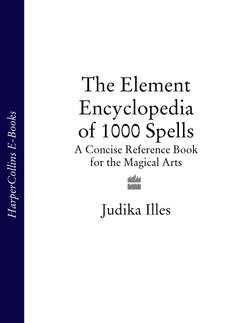Читать книгу The Element Encyclopedia of 1000 Spells: A Concise Reference Book for the Magical Arts - Judika Illes - Страница 85
Spell-casting with Words
ОглавлениеWorking magical practitioners tend to have a loose definition of what constitutes a magic spell. Once one becomes truly involved with magic and spell-casting, every action of the day can become transformed into a magic spell. Scholars of magic, particularly those who study a topic that fascinates them but in which they don’t actually believe, may have more rigid definitions. For many, verbal spells are the strictest definition of what constitutes a spell.
Technically, the use of the word “charm” to indicate a “lucky charm” is a misnomer. Lucky charms are talismans, amulets or magically empowered items. “Charm” derives from the same source as “Carmen” or “carol,” as in a Christmas song, and indeed charm at its most archaic means a song. To be en-chanted literally means to be under the magical influence of a chant. By the strictest, most scholarly definition of a magic spell, every spell should have a verbal component, preferably sung, and perhaps only a verbal component. Certain magical traditions do emphasize this verbal component, particularly traditional Russian magic and modern Pow-Wow. However, this strict definition can only be used in an abstract, theoretical scholarly setting; it doesn’t take into account either the realities of magic or the needs of many spell-casters.
Great, renowned systems of magic, such as those belonging to the Finn and Saami traditions, are under-represented in this book. Their magical systems were traditionally based on each individual practitioner’s unique repertoire of songs and thus cannot be reproduced in book form. Legendary practitioners were able to sing magic into fruition; any practitioner worth his or her salt, for instance, allegedly possessed a song that could stop a wound from bleeding.
This desire to insist upon a verbal component to every spell is very Eurocentric. This emphasis on the magic power of words doesn’t necessarily exist, or at least not to the same extent, in traditions from Asia and Africa. That said, the power of words in magic spells is profound. Words convey power and intent, and can be used to create realities where none existed previously, which is, after all, the goal of many magic spells. Words, sounds, and syllables may possess their own inherent power in the same fashion that minerals and botanicals do. Zora Neale Hurston, the author and scholar/practitioner of magic, on considering the origins of magic and magic spells, suggested that God was the original Hoodoo Doctor, having spoken the world into creation with magic words.
Verbal components, like spiritual petition, may be incorporated into any spell. However, words are tricky and subject to individual taste. The classic is abracadabra: some perceive it as a word of power, others as an old joke. The verbal component of the spell has to suit the spell-caster’s taste, otherwise it can derail the whole spell.
Some tips on spell-casting language:
Repeating the words of a magic spell should never make you feel foolish, stupid, self-conscious, or uncomfortable. Change the words to suit your taste and temperament. It will undoubtedly not be the first or last time they are changed
The majority of the spells in this book are traditional. Not every traditional spell has a verbal component, however where traditional verbal components of spells exist they have been retained. Many spells feature archaic language—language as it’s no longer spoken and perhaps never was. An attempt to enhance magical ambience often means resorting to pseudo-archaic language. Some enjoy throwing “thees,” “thous,” and “forsooths” into spells. This author isn’t among them. In general, except where archaic language was somehow intrinsic to the spell or to conveying its specific character, I’ve used modern language, updating and adjusting where necessary, because magic spells, no matter how ancient their roots, are a modern art, not relegated to the dusty past. However if you like all those “thees” and “thous,” if you enjoy archaic language, if it enhances your sense of magical ambience, adjust the spells to suit your taste and put them back
Many associate the verbal component of spells with rhymes. If you enjoy rhymes, that’s fine, however rhymes are not required. The advantage of rhymes is that they’re easily remembered, which can be crucial if it’s a spell that requires you to exactly repeat incantations at intervals, however what is being said is almost invariably more important than the literary devices used to say it
It is crucial that the verbal component of a spell express your goals and desires accurately, concisely, and without ambiguity, because living magical forces sometimes enjoy playing tricks. Change and adapt as needed. Make up your own words, keeping them simple and to the point, or use words composed by others that best express your desires. Psalms are traditionally used in this way; poems or the lyrics of your favorite songs may be able to articulate your desires and goals more accurately than any ancient charm
